Ukraine crisis: ‘Massive’ cyberattack shuts down main government sites
Ukraine is under a “massive” cyberattack after Russian President Vladimir Putin declared Moscow’s interests “non-negotiable” and Russian troops appear ready to launch a full-scale invasion.
World
Don't miss out on the headlines from World. Followed categories will be added to My News.
Ukraine is under a “massive” cyberattack with the main websites of the government and foreign ministry crashing and unable to open, according to a senior minister.
Deputy Prime Minister Mykailo Fyodorov said the attack began in the late afternoon and affected several banks as well as official websites, without specifying its origin, on Wednesday.
The official site of Ukraine’s cabinet of ministers and the foreign ministry refused to open when AFP tried to access it on Wednesday.
But most of the main news sites in Ukraine were working, as well those of banks and the main public institutions.
Fyodorov said the functioning sites had managed to “switch traffic to a different provider to minimise the damage.” The sites of several ministries and banks also went down for a few hours last week, with officials suggesting the denial-of-service (DDoS) attack was of Russian origin.
Ukraine is facing mounting fears of a Russian invasion, which have intensified after the Kremlin recognised the independence of Ukraine’s two eastern separatist region.
On Wednsday, the US warned the UN General Assembly, which is meeting to discuss Ukraine, that a Russian invasion of the countrycould displace as many as five million people.
“If Russia continues down this path, it could - according to our estimates - create a new refugee crisis, one of the largest facing the world today,” America’s ambassador to the UN, Linda Thomas-Greenfield said.
UN Secretary General António Guterres sais that the world is facing a “moment of peril” over the Ukraine and Russia tensions.
Addressing the UN’s General Assembly, Mr Guterres said it is time for “restraint, reason and de-escalation” to avoid “a scale and severity of need unseen for many years”.
“It is time to establish a ceasefire and return to the path of dialogue and negotiation,” he said.
Guterres added that he is “fully committed to resolve this crisis without further bloodshed”.
Earlier, Russian President Vladimir Putin said Moscow was ready to look for “diplomatic solutions” to the Ukraine crisis, but not at the cost of his country’s interests. Putin, speaking in a video address to mark the Defender of the Fatherland Day public holiday, said Russia was “always open for direct and honest dialogue, for the search for diplomatic solutions to the most complex problems”.But he went on to add: “The interests of Russia, the security of our citizens, are non-negotiable for us.”
His comments came after the Russian parliament’s upper house, the Federation Council, on Tuesday gave him unanimous approval to send “peacekeepers” to two breakaway Ukrainian regions Moscow now recognises as independent.
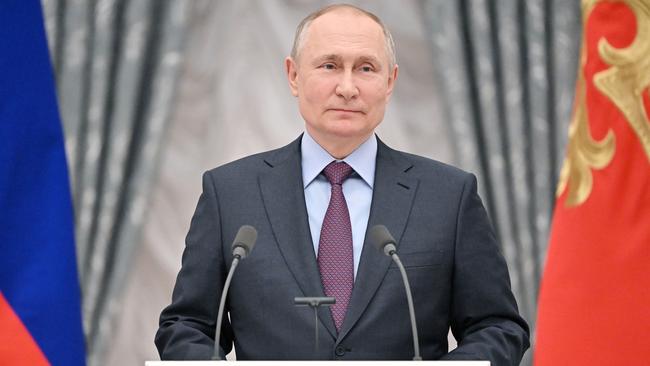
They may also go into other parts of Ukraine.
Putin went on to add what many would see as a veiled threat, praising his nation’s armed forces and looking forward to them developing new weapons.
“We will continue to develop advanced weapon systems, including hypersonic and those based on new physical principles, and expand the use of advanced digital technologies and elements of artificial intelligence,” he said.
“Such complexes are truly the weapons of the future, which significantly increase the combat potential of our armed forces.”
On Tuesday, US President Joe Biden announced tough new sanctions against Russia for “beginning” an invasion of Ukraine but said there was still time to avoid war.
AUSTRALIA MAKES A STAND
Scott Morrison has announced a suite of sanctions in response to Russia’s invasion of Ukraine, which he has labelled “unjustified, unwarranted, unprovoked and unacceptable”.
The Prime Minister convened an emergency meeting of cabinet’s national security committee on Wednesday to discuss the next steps as the crisis in Ukraine ramps up.
In lock-step with the United States and the United Kingdom, Australia will place sanctions on five Russian banks, as well as on a number of industries – transport, energy, telecommunications, oil, gas and mineral reserves.
Mr Morrison’s announcement came a day after Russian President Vladimir Putin ordered troops into two rebel regions in eastern Ukraine on a “peacekeeping mission”.
Overnight, United States President Joe Biden has described the move as an “invasion” and on Tuesday night local time vowed to impose tough sanctions.
Earlier, Foreign Affairs Minister Marise Payne said Australia would use “whatever tools we have available” to impose tough sanctions and would consider expelling Russia’s top diplomat in Canberra.
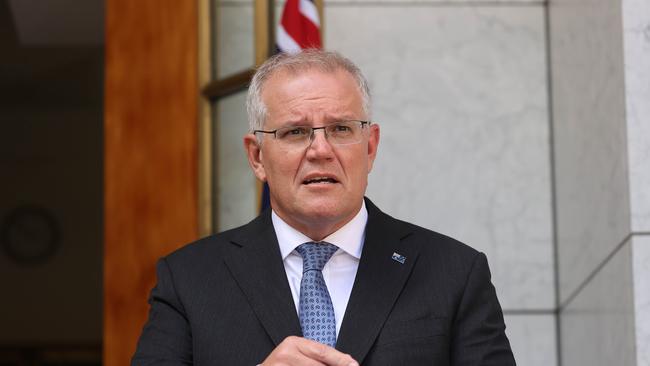
“It’s important to remind Australians that we have existing sanctions in place (against Russia) and they have been imposed since 2014,” Senator Payne told ABC Radio on Wednesday.
“We have been working with counterparts of my department of foreign affairs and trade, with partners around the globe, particularly in the US and the UK, and I’ve been discussing this with European Union colleagues (in Europe).”
While Senator Payne would not be drawn on what types of sanctions Australia could impose on Russia, she said there would be an impact and “clear penalties for Russia should they proceed with this”.
She said one such penalty being considered was expelling the Russian ambassador.
“Dealing with diplomats in that way, whether it is expulsions or recalls, is always an option,” Senator Payne said.
“Focus at the moment though is on targeted sanctions that will have an impact on those responsible. So while there are other options and other tools in the toolkit, such as how we deal with diplomats, that’s a matter I’ll turn my mind to at an appropriate time.”
Charge d’Affaires of Ukraine in Australia Volodymyr Shalkivskyi said on Wednesday morning that Australia and its allies should target Russia’s “most sacred area” of its economy and impose sanctions on energy.
“The energy companies provide the most revenue for the Russian budget, money that the Kremlin uses to finance military campaigns around the world,” Mr Shalkivskyi said.
“We appreciate the already implemented sanctions against Russia and the strong political statements (of Australia).
“We need Australia to join its partners in applying additional sanctions against Russia.
“We hope the Australian government will find possible ways to provide additional non-military assistance.”
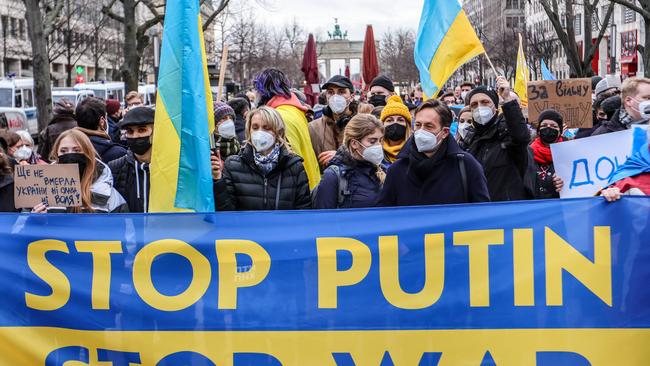
Senator Payne prefaced her warning of sanctions by saying Russia “still had a choice” not to proceed with their invasion.
“I don’t agree that there is no stopping a comprehensive invasion because Russia still always has the option not to proceed,” she said.
“That’s what we … and like-mindeds have been calling for.”
Earlier this week, former prime minister Tony Abbott said a “new iron curtain will soon ring down on Europe if we don’t do more to defend Ukraine”.
Senator Payne said it wasn’t helpful to speculate “in that way”, noting the sovereignty of countries in the region “is obviously an absolute”.
“We have to be absolutely clear that there is a cost to Russia for such behaviour, and that is severe sanctions that will target Russian individuals and entities that are responsible for these actions,” she said.
“We have to ensure that we are standing with our counterparts across Europe, whether it is the countries that I have been meeting with in recent days – many of whom understand the vulnerability that Ukraine is facing.
“And themselves, see troop build-ups along long borders with Russia, see what’s happening in Belarus and are deeply concerned.
“We share those concerns. We are united with many partners … in supporting their sovereignty and their territorial integrity.”
BIDEN’S GRIM WARNING
US President Joe Biden said that Russia has begun to invade Ukraine and plans to go much further than he had previously indicated.
“This is the beginning of a Russian invasion of Ukraine,” the US leader said, referring to Russian President Vladimir Putin’s stated plans to send troops deep into the Donbas region.
“He’s setting up a rationale to take more territory by force,” Mr Biden said in an address from the White House.
“And if we listened to his speech last night … he’s setting up a rationale to go much further.”
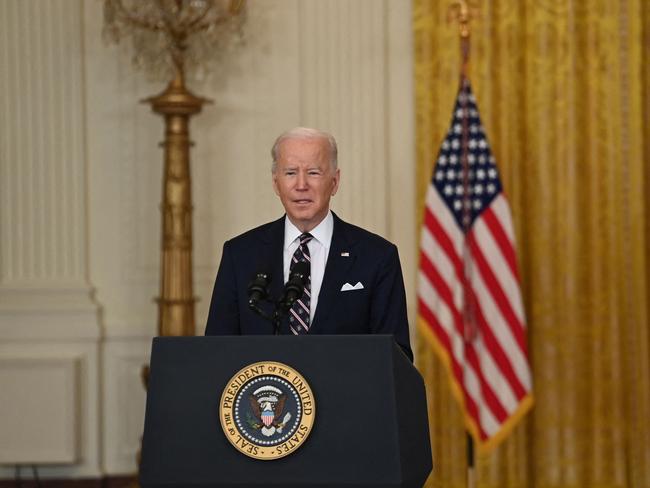
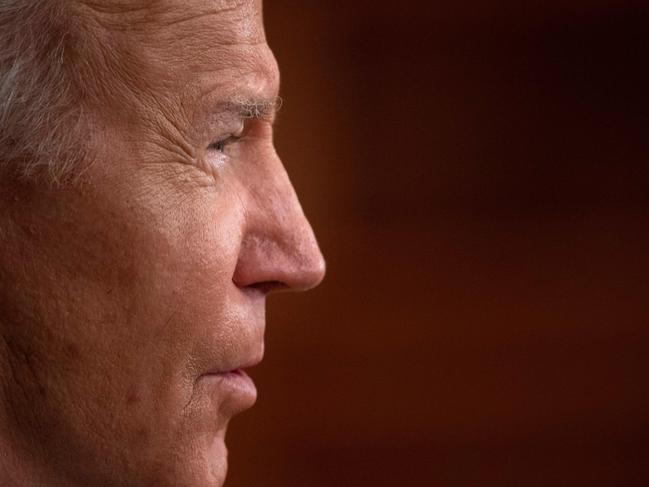
Mr Biden announced more sanctions targeting Russian finances and political elite, in hopes that the pressure will deter a wholesale invasion.
He said that the United States would continue to supply “defensive” weapons to Ukraine and deploy more US troops to reinforce NATO allies in Eastern Europe.
But he suggested that diplomatic talks could stem a worsening of the crisis, one of the deepest in Europe since World War II.
“There’s no question that Russia is the aggressor, so we’re clear-eyed about the challenges we’re facing,” Mr Biden said.
“Nonetheless, there is still time to avert the worst case scenario that will bring untold suffering to millions of people if they move as suggested.”
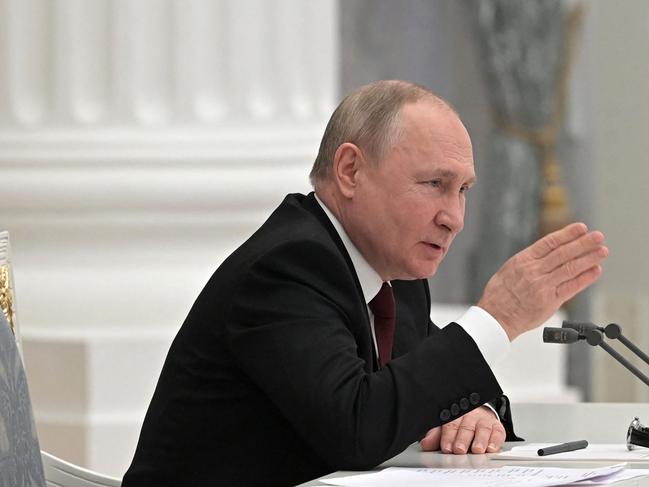
It came as NATO Secretary-General Jens Stoltenberg warned that Moscow planned to launch a “full-scale attack” on Ukraine.
“We urge Russia in the strongest possible terms to choose the path of diplomacy,” Mr Stoltenberg told reporters.
“This is the most dangerous moment in European security for a generation.
“Every indication is that Russia continues to plan for a full-scale attack on Ukraine.”
Meantime, Scott Morrison has called an emergency meeting of Australia’s peak decision making body for national security, with sanctions against Russia likely to be outlined.
The Prime Minister will convene a meeting of cabinet’s national security committee on Wednesday morning to discuss next steps as the crisis in Ukraine ramps up.
He is expected to address the media later on Wednesday.
The meeting came after Mr Putin ordered troops into two rebel regions in eastern Ukraine on a “peacekeeping mission”.
‘UNDER INVASION’
Russian President Vladimir Putin publicly authorised troops’ entry into two breakaway provinces in east Ukraine, effectively starting the border invasion that Europe has feared for weeks would lead to the biggest conflict since World War II.
The West moved immediately to enact a raft of long-threatened economic sanctions to prohibit trade and investment to and from the provinces but stopped short of targeting Russian finances to the same degree.
A top adviser to the Biden administration said that Ukraine was already under “invasion” following Mr Putin’s orders for Russian troops to enter rebel-held areas of eastern Ukraine.
“An invasion is an invasion and that is what is underway,” deputy White House national security adviser Jon Finer told CNN on Tuesday.
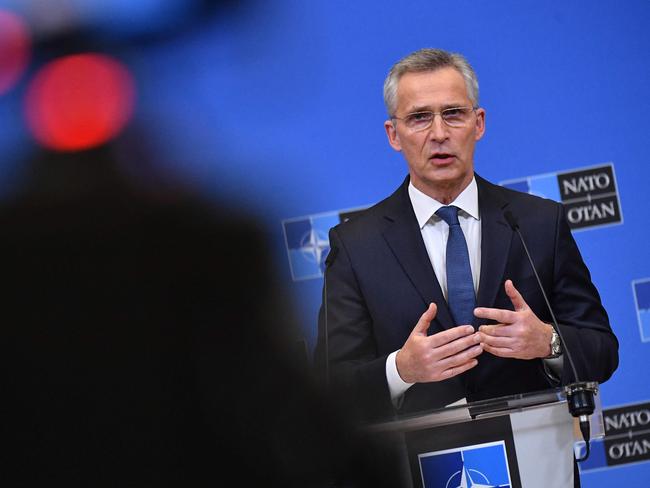
“Russia has been invading Ukraine since 2014 … I am calling it an invasion.”
The description of Russia’s troop movements is significant because Mr Biden has threatened ruinous economic sanctions against Russia if it “invades” Ukraine – even though, as Mr Finer referenced, Russia has propped up separatist groups in the Donetsk and Luhansk regions since 2014.
“We’ve always envisioned waves of sanctions that would unfold over time,” Mr Finer continued.
“Today, we have already begun those actions in response and we have more that we will be rolling out in really just a matter of hours.”
Mr Finer added that Washington’s response would be “swift and severe”.
US President Joe Biden is scheduled to announce new sanctions on Russia at 6am AET Wednesday.
Ok, now it's "the beginning of an invasion, Russia's latest invasion into Ukraine,†the NSC's Jon Finer told @brikeilarcnn. “An invasion is an invasion, and that is what is underway, but Russia has been invading Ukraine since 2014...I am calling it an invasion."
— Alexander Marquardt (@MarquardtA) February 22, 2022
In a press conference, Mr Putin defended his decision to move troops into the region but wouldn’t provide a timeline for their deployment, after Russia’s upper house of parliament approved sending forces abroad.
“Firstly, I didn’t say that the troops would go there right after our meeting with you here, that’s the first thing,” Putin said in response to a question from reporters.
“Secondly, it’s impossible to predict any specific outline of possible actions at all, it depends on the specific situation that is developing on the spot, on the ground what is called,” he said.
Mr Putin also repeated his calls for Crimea to be recognised as part of Russia and a halt to weapons shipments to Ukraine and an end to the country’s NATO bid.
British Prime Minister Boris Johnson announced sanctions on five Russian banks and three wealthy individuals, freezing their UK assets and banning travel to Britain. It came as German Chancellor Olaf Scholz stopped the progression of the controversial Nord Stream 2 pipeline in response to Moscow’s actions in eastern Ukraine. The pipeline, which would have increased European reliance on energy from Russia, cannot run without undergoing the certification or approval process.
The US earlier ordered its embassy which had already moved from Ukraine’s capital Kiev further west to second city Lviv to leave Ukraine altogether and relocate to Poland with fears Russia war plans had begun. There were already reports of increased “skirmishes” in the east of the country.
The Russian president issued decrees recognising the two Ukrainian provinces of Donetsk and Luhansk as individual republics in a nationally televised address to Russians, thereby allowing him to deploy troops on the pretext of protecting the interests of independent states.
Russian state media showed unverified footage purporting to be from east Ukraine of locals waving Russian flags and launching fireworks to “celebrate” Mr Putin’s decrees, expected to attract strong domestic support from those who rued the day in 1991 when the whole of Ukraine declared independence.
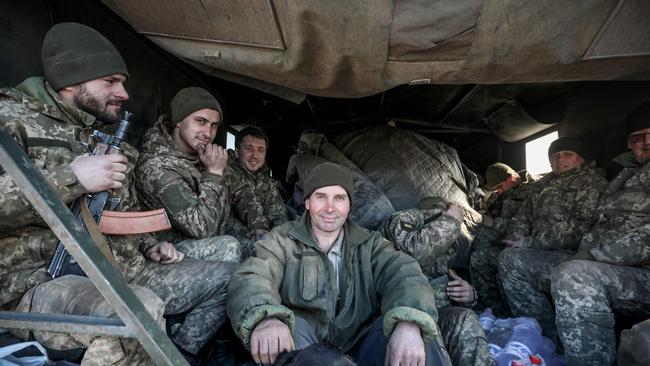
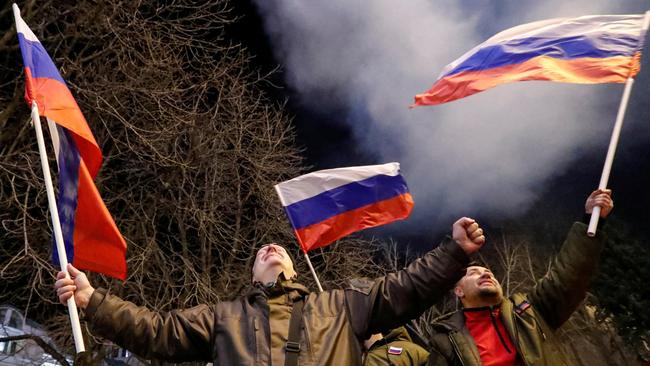
Militia in the two provinces had launched a secessionist movement in 2014 backed by Russian troops and arms in an eight-year simmering conflict that has cost 15,000 lives.
But Russia had stopped short of sending in more troops to the region after warnings from the European Union and NATO.
In two official decrees, Mr Putin instructed the defence ministry to assume “the function of peacekeeping” in the Donetsk and Lugansk regions and formally establish diplomatic relations with the world’s newest republics.
His announcement, which at times included a rambling history of European politics, was viewed as authorising troops to move into the east.
Three days ago local authorities in the region moved to evacuate some 800,000 citizens across the Russian border for their safety.
Putin’s move attracted immediate condemnation from the international community and the triggering of some sanctions that the EU and allies including the United States had threatened for month.
In a flurry of telephone calls, US President Joe Biden, France’s Emmanuel Macron and German Chancellor Olaf Scholz said the Kremlin’s gambit “would not go unanswered”.
British Prime Minister Boris Johnson has chaired the emergency Cobra crisis team to “explore” what more Britain militarily can do for Ukraine.
Australian Prime Minister Scott Morrison condemned Russia’s move, rubbished Mr Putin’s “peacekeepers” claim as nonsense and said Australia remained “in lock step” with European Allies on imposing strong “and severe” sanctions.
He said the world had to ensure Russia stood down.
“Russia should step back, it should unconditionally withdraw back behind its own borders and stop threatening its neighbours, we’ve seen this behaviour before and seeking to take opportunities and threaten a neighbour for their own advantage is simply not on, it’s unacceptable, it’s unprovoked it’s unwarranted,” he said.
“Russia should understand that by seeking to invade another country that this cannot advantage them and would seriously and significantly cost Russia and their international reputation and anyone that supports them and stands with them and refuses to denounce it.”
His last remark was a veiled swipe at China which Mr Morrison had previously called on to denounce Russia’s actions.
Australian embassy staff and officials have been directed to evacuate Ukraine as the government issues a grim warning to remaining citizens to not delay leaving.
Foreign Minister Marise Payne said the government condemned Russia’s unlawful moves on eastern Ukraine and flagged the introduction of “swift and severe sanctions”.
“We continue to urge all Australians to leave Ukraine immediately. Do not delay. The safety of Australians and officials is our priority,” Senator Payne said in a statement.
“Due to the increased risk, Australian officials have been directed to depart Ukraine. Our embassy and operations in Lviv are now temporarily closed. Australian officials have been deployed to eastern Poland and Romania to assist Australians seeking to depart Ukraine.”
Surprisingly, NATO’s usually opaque member Turkey also condemned the Kremlin’s “violating international agreement” and also backed sanctions.
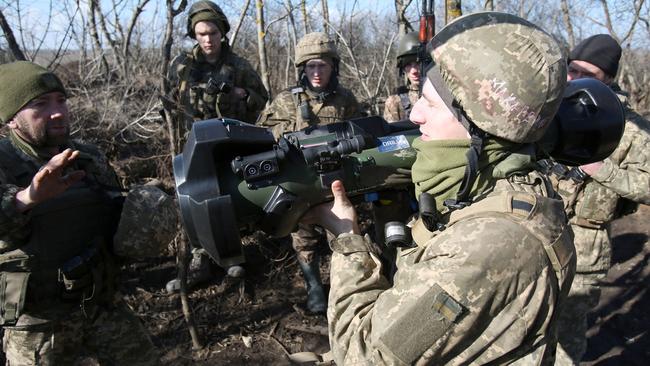
‘PROBLEMATIC FOR PUTIN’
A code word revealed unexpectedly in Russia eight years ago derailed Vladimir Putin’s imperialist ambitions and Ukrainians hope it will again.
The term “Cargo 200” and “Cargo 300” is Russian military code for soldiers killed and soldiers wounded in action and would not have been widely known had they not had to be used repeatedly from 2014.
That was about the year the Russian military invaded Ukraine’s south east to train, arm and support militia in Ukraine’s Donetsk and Luhansk provinces as they sought to become independent “republics”.
At the time, the Kremlin denied its troops were crossing the border.
The Organisation for Security and Cooperation in Europe (OSCE), the multinational monitoring group, came across the term and matched it to vans carrying Russian dead back across the border into Russia.
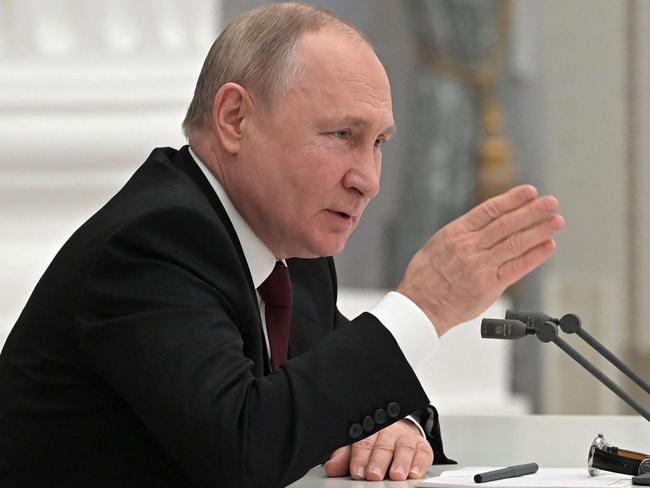
“This became problematic for Putin because sons were being returned in coffins and no-one was saying why and families were told to stay silent,” said a Moscow-based correspondent speaking on condition of anonymity.
“People were being told they were killed in training exercises and these sorts of things and no-one was really reporting (in Russia) that we were fighting in Ukraine.
“But then there were too many and people started to ask questions, then this term became known and there was some anger the truth was not being told.”
The Kremlin initially dismissed reports as propaganda but later conceded some “Russian volunteers” on leave from military service were fighting alongside the separatist rebels.
But analysts suspected the potential for widespread domestic backlash and growing West commentary put paid to Mr Putin further pursuing the rebel’s cause at that time.
The question remains whether there would be a domestic backlash again.
The Cargo 200 term is believed to have developed in the 1980s from the Soviet-Afghanistan war from both a command order number and the standardised maximum weight for air transportation of a deceased soldier’s body
More Coverage
Originally published as Ukraine crisis: ‘Massive’ cyberattack shuts down main government sites



